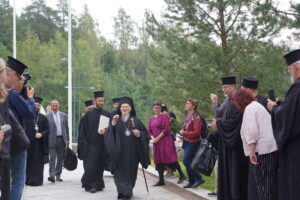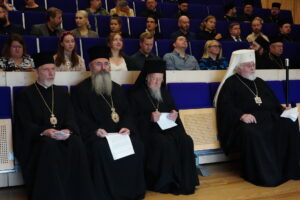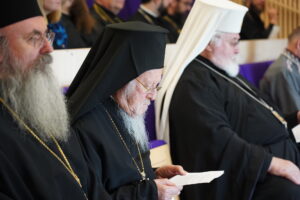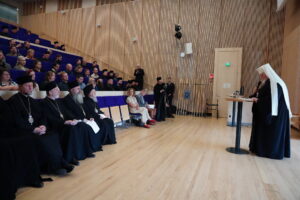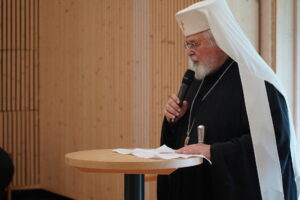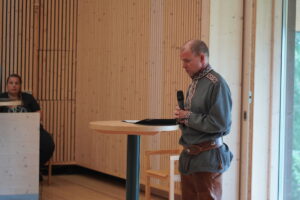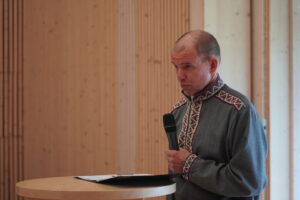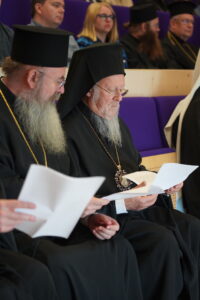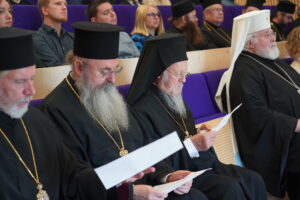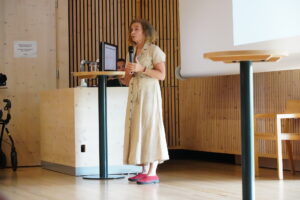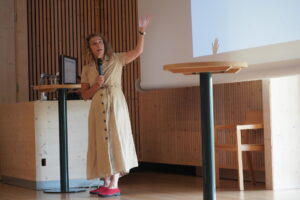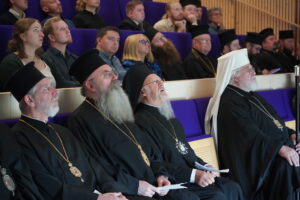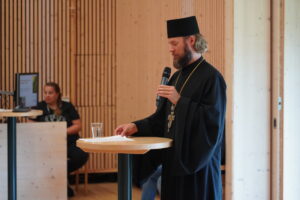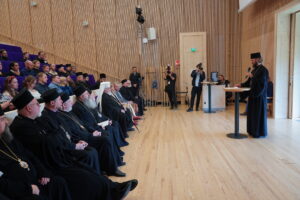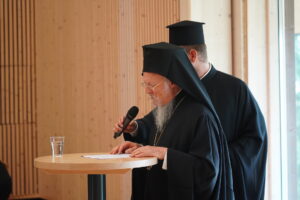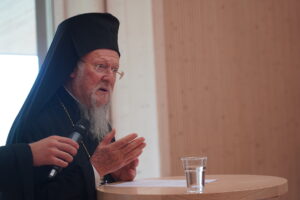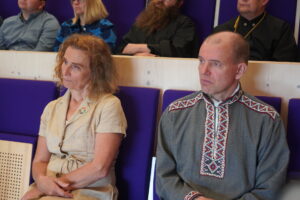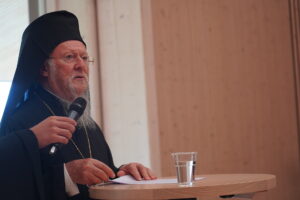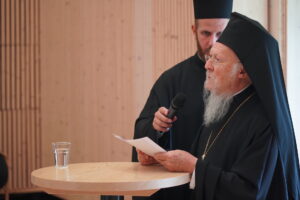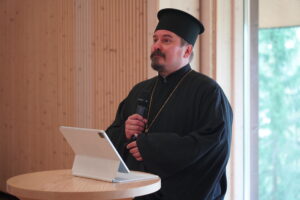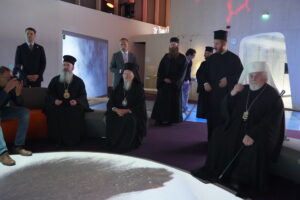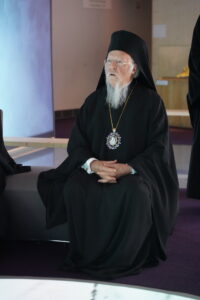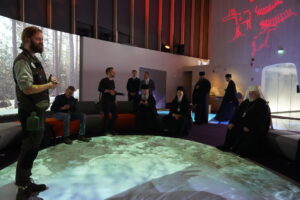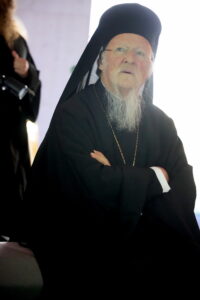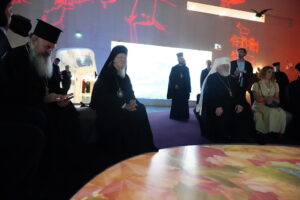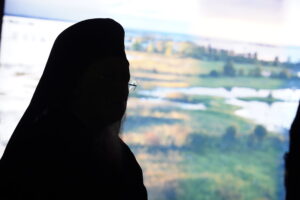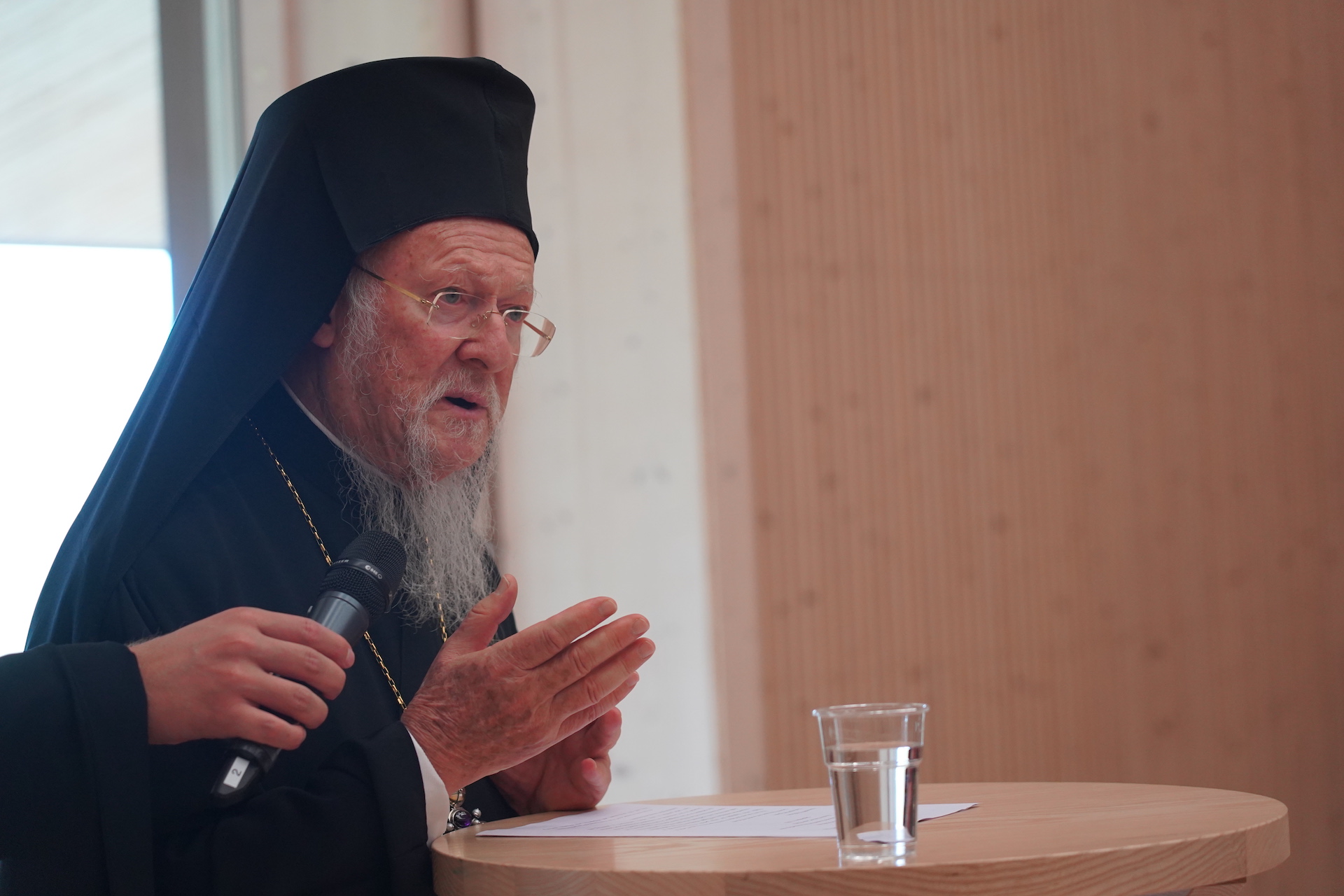
***
Honorable dignitaries,
Distinguished guests,
Dearest young men and women of Finland,
It is such a joy and privilege to visit this spectacular Nature Center of Haltia, which highlights the nature beauty of Finland through its extraordinary exhibitions and rugged wilderness. This year marks Haltia’s tenth anniversary and is dedicated to the great outdoors. I can think of no more charming venue than this for your Planet of the Youth Seminar. I am also delighted to be here alongside Dr. Eeva Furman, Finland’s General-Secretary of the Commission on Sustainable Development. Her presence here today testifies to your nation’s commitment to protecting and sustaining the natural environment.
As you may be aware, our Church, the Ecumenical Patriarchate, has a long and rich involvement and engagement with ecological matters, beginning as early as 1989, when it issued its first environmental encyclical. Over the last thirty-two years of my own ministry, the earth as God’s unique gift and creation has been at the very center of our concern and outreach. Our efforts to raise awareness among government and religious leaders has guided us to organize international, interfaith, and interdisciplinary symposia throughout troubled regions of the world, including the Amazon and the Arctic, the Adriatic and the Baltic, the Mississippi and the Mediterranean. To this day, we continue this witness, initiating groundbreaking statements in close collaboration with Pope Francis and Archbishop Justin Welby of Canterbury.
Haltia is renowned for its endless and exceptional trails, which are suited to many different activities (including walking, biking, and camping) for all levels of experience. It may surprise you that, already in my early 80s, one of my favorite pastimes remains trail-hiking, for which I acquired a passion from my youngest years on a small island off the coast of Turkiye. Wherever I happen to be on my very full agenda of church administration, liturgical services, and pastoral ministry, I love to walk through natural parks and reservations, as well as fields and mountains. This is especially the case in my native island of Imvros, which I try to visit several times each year. However, even in the busy and overpopulated city of Istanbul, I am constantly looking for areas where I can walk with friends. It is at those moments when I both draw inspiration for my complex obligations and at the same time retreat in silence from my demanding responsibilities.
My appreciation for the natural environment is directly related to the sacred dimension of life and the world. I have always regarded the natural environment from the perspective of spirituality. I have always respected creation as a place of encounter and communion with the Creator. As a young boy, I would accompany Fr. Asterios, the parish priest of my local village, to services in remote chapels on the hillsides of Imvros. We would leave at sunrise and carry the necessary church vessels to charming chapels on summits, from where we could see Turkiye, Greece, and even Mt. Athos on all sides of the Aegean Sea. The grandson of Fr. Asterios, who actually has the same name as his grandfather and whom I ordained to the priesthood in 2010, is today the parish priest in the same village church. So as you can see, from a very young age, I connected the beauty of the mountains to the splendor of the liturgy.
In fact, I am convinced that this is because the natural environment seems to provide me with a larger, broader, panoramic vision of the world. The beauty of nature leads all of us to a wider, more open view of the life and the created world. Think of it as being something like a wide-angle focus from a camera. This is what ultimately prevents us as human beings from exploiting or abusing the planet’s natural resources. In a similar way, it is through the spiritual lens of my faith that I can better appreciate such problems as the threat to ocean fisheries, the disappearance of wetlands, the damage to coral reefs, or the destruction of animal and plant life.
This is because, as an ancient Christian prayer states:
The heavens declare the glory of God; the earth proclaims His sovereignty; the sea heralds the authority of the Lord; and every material and spiritual creature preaches the magnificence of God at all times. In Greek: “(Τριὰς γὰρ, εἷς Θεὸς παντοκράτωρ.) Οὗ τὴν δόξαν οἱ οὐρανοὶ διηγοῦνται, ἡ δὲ γῆ τὴν Αὐτοῦ δεσποτείαν, καὶ ἡ θάλασσα τὸ Αὐτοῦ κράτος, καὶ πᾶσα αἰσθητὴ καὶ νοητὴ κτίσις τὴν Αὐτοῦ μεγαλειότητα κηρύττει πάντοτε”.
Nature is a book, opened wide for all of us to read and to learn from. Each plant, each animal, and each micro-organism tells a unique story, unfolds a profound mystery, and relates an extraordinary harmony. The same story and mystery is detected in the galaxies, where the countless stars describe the same mystical beauty and mathematical inter-connectedness.
And we do not need this perspective in order to believe in God or even to prove His existence. We need it to breathe; we need it to survive; we need it simply to be. This reality was described by a mystic in the seventh century as a con-celebration of joy and love— a “cosmic liturgy,” as he called it.
This means that it is unfortunate, when we lead our life without even noticing the environmental concert that is playing out before our very eyes and ears. In this cosmic orchestra, each minuscule detail plays a critical role, and every trivial aspect contributes in a vital way. Nothing whatsoever—no human being, no living creature, and no cell or particle of nature—can be removed without the entire symphony being deeply affected. No single tree or animal can be removed without the entire picture being irreversibly distorted, if not destroyed.
The question that we must answer is this: When will we stop to hear the music of this harmony? It is an ongoing rhythm, even if we are not aware of it. When will we learn the alphabet of this sacred language, so mysteriously concealed in nature? It is so clearly revealed in the created world around us. When will we learn to embrace the awesome beauty of God’s presence on the body of the world? Its contours are so clearly visible. And, practically speaking, when will we accept that we must live more simply instead of so greedily? That is the only way we can reverse the ecological crisis.
In addressing these questions and challenges, your role as young citizens of the world will be pivotal. Of course, the environmental challenges that we face today are unprecedented, but so are the opportunities. And your generation stands at the forefront of seizing these opportunities. Why? Because you possess an unparalleled and undiminished passion—the resilience and capacity to dream of a world with alternative priorities and objectives. Throughout history, it is the younger generations which have often led the charge for change. From civil rights and justice to the fight for equality and inclusion, it has always been the spirit of youth that ignites fundamental transformation and revolutionary change.
Consider the environmental crisis. Rising temperatures, melting ice caps, disappearing species. These are not simply sensational headlines. They are urgent calls to action. And, although my generation is responsible and accountable for the damage to our planet and its resources, we are already seeing young people responding to this call. Because this is your future, and you want to protect it. Even if the scale of the challenges sometimes feels overwhelming, you should remember that change does not always start with massive shifts; it starts with individual actions. It starts with you! Each one of you has the power to inspire and educate your communities.
Moreover, the digital era has armed you with tools that no generation before you ever had. You can connect with like-minded individuals across the globe in an instant. You can share knowledge, strategies, and energy. Your voice can be heard in the highest echelons of power. So make sure that you harness the potential of technology for the good of the environment. But it is not just about harnessing technology or activism. It is also about small, everyday choices that we make. Like planting a tree, refusing single-use plastics, educating and mobilizing others—all of these choices count and all of them add up. And as you influence your friends, families, and communities, you create a wave of change that reverberates across continents.
Our environment is not just a backdrop for our existence. It is the very stage upon which our human story unfolds. By defending and sustaining it, you are doing much more than merely preserving trees, animals, or oceans. You are actually safeguarding cultures, communities, and memories. You are ensuring that future generations do not just survive, but thrive! The earth is not just our home, it is our life source, our legacy. Every breath of air, every drop of water, every stretch of land is a living testament to the intricate, complex, and fragile balance of life. Our planet is crying out—its forests, oceans, and skies are sending us emergency signals. We are at a turning point in history. The choices we make now, especially the choices you make as young women and men, will shape the destiny of our planet for generations.
You might be asking yourselves: Why is a religious leader, an Orthodox Patriarch, involved in creation care? What does God have to do with the ecological crisis? I can tell you that the source of my interest and concern for the natural environment is not politics or economy; my work for raising awareness about the need to protect and preserve the earth and its resources is not something fashionable or a matter of public relations. It is the conviction of my Christian faith in a God, who created all things visible and invisible. A God whose own Son became human so that the world may live. This is the heart and essence of Christian teaching and tradition.
And it means that we are all part of something far greater than ourselves. In the whisper of the trees, the vastness of the seas, and the eyes of a child, we see a reflection of the divine. God’s presence teaches us the values of love, stewardship, and respect of creation. In worshipping God as Creator, we venerate the earth as His creation. Imagine a world where caring for the environment is not just a personal interest, but a divine responsibility. I urge you to seek inspiration from scriptures, from prayers, from spiritual leaders. Remember that you carry the torch, the environment is the path, and God is the light.
My dear friends,
You are the future stewards of the planet’s health and wholeness. And I assure you that there is an inseparable connection between the vibrancy of youth, the urgency of climate, and the commandment of God. This is what gives me immense hope. You! Your undying energy, your unbridled creativity, and your unyielding commitment to change remind all of us that the future is not written in stone, but in the hearts and minds of human beings, especially the young.
May God bless you, your families, and your friends.
__________
photos: Nikos Papachristou

